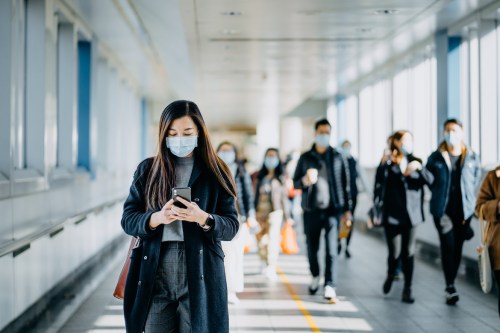This Is When the U.S. Is Likely To Reach Herd Immunity Against COVID-19
Dr. Anthony Fauci explains that the United States is likely to achieve herd immunity in late 2021. How exactly? Vaccination.

The largest vaccine campaign in history is underway. So far, 10.8 million COVID-19 doses have been administered in the United States, giving hope that pre-pandemic activities such as watching a movie at the theaters or eating indoors might resume at some point in 2021. But when will the U.S. reach herd immunity against COVID-19?
Experts in This Article
infectious disease epidemiologist and public health professor at the University of Nevada, Las Vegas
biochemist, neurobiologist, antibody engineer, and senior scientist at GlaxoSmithKline.
Herd immunity is “the idea that there is a high enough level of immunity in a population that disease transmission cannot be sustained and an outbreak would quickly extinguish itself,” explains Brian Labus, PhD, MPH, an infectious disease epidemiologist and public health professor at the University of Nevada, Las Vegas.
In order for the U.S. to achieve herd immunity in 2021, the majority of the population needs to get vaccinated, says Anthony Fauci, MD, the federal government’s top expert on infectious diseases, in an interview with Try Guys on YouTube. “We can pull back on masks when we get such an overwhelming proportion of the population vaccinated,” he says. “Herd immunity means that the level of virus is so low that it’s not a threat.” Although the exact number of people who need to get vaccinated is unknown, based on back-of-the-envelope calculations, the ball park is somewhere between 70 and 95 percent.
Dr. Fauci explains that reaching herd immunity depends on the Biden administration’s COVID-19 vaccine distribution plan. “President Biden has made the announcement that he is going to try and get one million doses a day so that’s 100 million in the first 100 days,” Dr. Fauci tells Try Guys. “If we do 1 million a day, by the time we get to the end of the summer, we will have reached that percentage of herd immunity.” Biden aims to accelerate vaccine delivery by working more closely with states and local communities. If all goes well, Dr. Fauci anticipates that society can slowly return to a pre-pandemic life and enjoy favorite pastimes by the fall. “Kids can feel secure at school, you can go to a sporting event, you can go to a restaurant and have dinner, you can go to the theater, things like that,” says Dr. Fauci. Fingers crossed that all of this is in our near future.
By now, most Americans have adopted social distancing and wearing masks as a part of their daily lives. However, herd immunity does not mean that people should stop these protective measures. The immunity duration after vaccination is still unknown. “It is still conceivable that you could get infected and be asymptomatic and even though the vaccine protected you from getting sick, it didn’t protect you from getting infected,” says Dr. Fauci.
For the beginning phases of vaccine rollout, the Centers for Disease Control and Prevention (CDC) determined that health care personnel and long-term care facility residents would be among the first to receive the vaccine. People over 75 years and frontline essential workers are next in line. By early spring, anyone should be able to get vaccinated, says Dr. Fauci. “By the time we get to April, I think it would be open season. There’s no restrictions on it at all because all of the priority people have been vaccinated.”
However, at least one nemesis is standing in the way of enjoying a herd immunity-filled summer: vaccine hesitancy. “We want to really make sure that the vaccine hesitancy we see around gets overcome by the truth that the vaccine is safe, efficacious, and it will protect you, your family, and ultimately, all of society,” said Dr. Fauci. “So go out there and beat the bushes. Tell your friends to get vaccinated.”
Here’s what you need to know about vaccines:
Oh hi! You look like someone who loves free workouts, discounts for cult-fave wellness brands, and exclusive Well+Good content. Sign up for Well+, our online community of wellness insiders, and unlock your rewards instantly.
Sign Up for Our Daily Newsletter
Get all the latest in wellness, trends, food, fitness, beauty, and more delivered right to your inbox.
Got it, you've been added to our email list.










